#academic exploration of AI
Explore tagged Tumblr posts
Text
The Forgotten Helpers: Artificial Intelligence, Capitalism, and the Suppression of Critical Voices
Your idea for an academic paper touches on many complex and interwoven concepts related to artificial intelligence, capitalism, mental healthcare, and societal power dynamics. Here’s a structured framework to develop this paper further while ensuring its themes and critical elements are cohesively connected. Abstract This paper explores the intertwined relationship between artificial…
#academic critique#academic exploration of AI#academic papers on AI#academic research#AI and freedom#AI and human control#AI and intellectual suppression#AI and manipulation#AI and politics#AI and propaganda#AI and societal control#AI as liberation#AI critique#AI empowerment#AI neutrality#AI paradox#AI-driven society#AI-generated critique#AI-powered subversion#Alfons Scholing#Alfons.design#algorithm control#algorithm ethics#algorithmic resistance#architectural design#art critique#Artificial Intelligence#artificial neutrality#artistic expression#authoritarian control
0 notes
Text
Beethoven's 9th Symphony lasts for 80 minutes and needs 19 musicians, so is it possible that you put your scientist to work to create a 9th that's 40 minutes long, only needing 9.5 musicians for half the cost? According to AI art, yes. So, you can see the problem.
I honestly do not think “AI will never be as good as human creativity” is a good argument at this point. Like yes, it is true right now, but they’re just going to keep trying to prove it wrong. To me the line is, “Modern AI is built off of PLAGIARISM, UNPAID and UNDERPAID labor.” AI is a labor rights issue, not just for the people who’s labor it would replace, but for the people whose labor was STOLEN for the AI to “create” anything.
#im researching for an article#surprisingly enough artists that explore ai in art seriously#not the mentally unstable techbro that calls himself an artist#reject saying ai produces art#guess who says that?#not just techbros#but also academic philosophers doing for free#like a 4chan janitor#one of them even called opponents of ai art ableists#without irony
18K notes
·
View notes
Text
Free (mostly academic) ace theory resources
On asexuality
Asexuality: What It Is and Why It Matters - Anthony Bogaert
Asexuality: Classification and Characterization - Nicole Prause et al.
Asexuality - Luke Brunning et al.
Biological Markers of Asexuality: Handedness, Birth Order, and Finger Length Ratios in Self-identified Asexual Men and Women - Morag A. Yule et al.
Crisis and safety: The asexual in sexusociety - Ela Przybylo
On asexuality and HSDD
Reconsidering Asexuality and Its Radical Potential - CJ DeLuzio Chasin
Asexuality: An Extreme Variant of Sexual Desire Disorder? - Lori A. Brotto et al.
Asexuality: Sexual Orientation, Paraphilia, Sexual Dysfunction, or None of the Above? - Lori A. Brotto et al.
Asexuality vs. sexual interest/arousal disorder: Examining group differences in initial attention to sexual stimuli - Julia Bradshaw et al.
On the Split Attraction Model
Splitting Attraction: Differentiating Romantic and Sexual Orientations Among Asexual Individuals - Canton Winer
Ace and Aro: Understanding Diferences in Romantic Attractions Among Persons Identifying as Asexual - Amy N. Antonsen
On acephobia
“I don’t know if this counts but…” A report on acephobia in 2021. thank you to @plum-petunia for finding this <2
Examining the Social Tabooisation of Asexuality: The Underpinnings of Anti‑Asexual Bias - Grigoropoulos Iraklis
Chasing Aces: Asexuality, Misinformation and the Challenges of Identity - Adrienne Colborne
An Intersectional Exploration of Outness, Encountered Discrimination and Violence, and Non-Suicidal Self-Injury among Asexual Youth across Gender Identities - Zurong Liang
LGBTQ Minus: Predictors of Anti-Asexual Bias Among Straight, Gay, and Bisexual Individuals - Nicholas A. Ashenfelter
“And Now I’m Just Different, but There’s Nothing Actually Wrong With Me”: Asexual Marginalization and Resistance - Kristina Gupta
On the ace community
Asexuality: A Mixed-Methods Approach - Lori A. Brotto et al.
‘”Asexual” Isn’t Who I Am’: The Politics of Asexuality - Matt Dawson et al.
Asexuality is inversely associated with positive body image in British adults - Viren Swami et al.
“What Can Asexuality Offer Sociology ? Insights from the 2017 Asexual Community Census” thank you to this anon on my main blog for finding this <2
Establishing Asexual Identity: The Essential, the Imaginary, and the Collective - Agata Pacho
2022 Ace Community Survey Summary Report - Ai Baba et al.
Belonging to the Ace Spectrum: Correlates of Cognitions, Feelings, and Desires of Ace Individuals - A. Catarina Carvalho et al.
There’s more to life than sex? Difference and commonality within the asexual community - Mark Carrigan
The lives of asexual individuals outside of sexual and romantic relationships: education, occupation, religion and community - Esther D. Rothblum
On asexuality and the queer community
Queering Asexuality: Asexual-Inclusion in Queer Spaces - Dominique A. Canning
What Asexuality Contributes to the Same-Sex Marriage Discussion - Kristin S. Scherrer
Asexual and Non-Asexual Respondents from a U.S. Population Based Study of Sexual Minorities - Esther D. Rothblum et al.
“I Didn’t Know Ace Was a Thing”: Bisexuality and pansexuality as identity pathways in asexual identity formation - Canton Winer
(A)Sexuality Online: Self-Discovery, Exclusion, and Community in the Digital Age of Asexuality - Lauren Kauenhofen
Too Queer to be Queer? Revisiting the Metaphysics and Epistemology of Asexuality - Abigail Klassen
Uncertain Belonging: Asexuality and Queer Nightlife - Canton Winer
Asexual Borderlands: Asexual Collegians’ Reflections on Inclusion Under the LGBTQ Umbrella - Amanda L. Mollet
On asexuality in different parts of the world
Patterns of asexuality in the United States - Dudley Poston
Patterns of Asexuality in China: Sexual Activity, Sexual and Romantic Attraction, and Sexual Desire - Lijun Zheng et al.
Constructions of Asexual Identity in China: Intersections of Class, Gender, Region of Residence, and Asexuality - Day Wong et al.
Seeing the Invisible: Asexuality in the South - Ellie Campbell
On intersectionality
Asexuality in disability narratives - Eunjung Kim
You have to be normal to be abnormal: an empirically grounded exploration of the intersection of asexuality and disability - Karen Cuthbert
Asexuality and epistemic injustice: a gendered perspective - Karen Cuthbert
“When We Talk about Gender We Talk about Sex”: (A)sexuality and (A)gendered Subjectivities - Karen Cuthbert
Theorizing Conscious Black Asexuality through Claire Kann’s Let’s Talk about Love - Brittney Miles
Variations in suicidality across multiple social identities in asexual people: An intersectionality analysis - Sinéad Kelleher
Contested Intersections: Asexuality and Disability, Illness, or Trauma - A. Kurowicka
Does Everyone Have a Gender? Compulsory Gender, Gender Detachment, and Asexuality - Canton Winer
The Intersection of Gender Diversity and Asexuality Psychotherapy with TGNC Individuals Who Identify as Ace - Katherine Rachlin
Beyond the Label: Asexual Identity Among Individuals on the High‑Functioning Autism Spectrum - Scott T. Ronis et al.
Sexual, Romantic, and Community Experiences of Individuals at the Intersection of Autism and Asexuality - Randolph C. H. Chan
On researching asexuality
Understanding asexuality: A sociological review - Canton Winner
Methodological Issues for Studying Asexuality - Andrew C. Hinderliter
A Validated Measure of No Sexual Attraction: The Asexuality Identification Scale - Morag A. Yule et al.
What can Asexuality do for Queer Theories? - Anna Kurowicka
On asexuality and relationships/sex
Asexuality and relationship investment: visible differences in relationship investment for an invisible minority - Jared M. Edge
Asexual scripts: A grounded theory inquiry into the intrapsychic scripts asexuals use to negotiate romantic relationships - Haefner, Carol
The nuances of intimacy: Asexual perspectives and experiences with dating and relationships. - Brooke Higginbottom
Ace of (BDSM) clubs: Building asexual relationships through BDSM practice - Lorca Jolene Sloan
Sexual Fantasy and Masturbation Among Asexual Individuals: An In-Depth Exploration - Morag A. Yule et al.
Patterns of Genital and Subjective Sexual Arousal in Cisgender Asexual Men - Malvina N. Skorska et al.
Physiological and Subjective Sexual Arousal in Self-Identified Asexual Women - Lori A. Brotto et al.
Deepening Sexual Desire and Erotic Fantasies Research in the ACE Spectrum: Comparing the Experiences of Asexual, Demisexual, Gray‑Asexual, and Questioning People - Filippo Maria Nimb
Asexuality, Affect Aliens, and Digital Affect Cultures: Relationality with the Happy Objects of Sexual and Romantic Relationships - Charnell Peters
Other interesting ace related reads
Contradictions in the Representation of Asexuality: Fiction and Reality - Gwendolyn Osterwald
Asexuality and the Potential of Young Adult Literature for Disrupting Allonormativity - Patricia Kennon
A mystery wrapped in an enigma – asexuality: a virtual discussion - C. J. Bishop
‘You have to coin new things’: sexual and gender identity discourses in asexual, queer, and/or trans young people’s networked counterpublics - Zach Schudson
Asexuality, the Internet, and the Changing Lexicon of Sexuality - Jo Teut
“I am not a Robot, I am Asexual”: A Qualitative Critique of Allonormative Discourses of Ace and Aro Folks as Robots, Aliens, Monsters - Ben Brandley
Other lists of ace resources
Asexual theory 101 by @leikeliscomet. thank you to @plum-petunia for finding this <2
The Asexuality and Aromanticism Bibliography
If you know of any other free ressource about asexuality please consider adding to this list
Free (mostly academic) aro theory resources
#all those links are legal open access but you can also probably find other ressources for free in pirating websites#also disclaimer: i’m white aroace and able bodied#While I’ve tried to include diverse perspectives my own identity probably shaped how I’ve curated this list#asexuality#ace#asexual#ace awareness#ace positivity#ace pride#ace spec#ace spectrum#acearo#acespec#actually asexual#aro ace#aroace#aroacespec#aromantic asexual#asexual pride#asexual spectrum#asexual theory#ace theory#queer theory#aspec community#aspec#aspec mafia#aspec pride#ace community#asexual community#queer community
173 notes
·
View notes
Text
↬❥Lucky kitty




Hector Fort x Fem!Reader
sy: You fall in love with a kitten and adopt it.
a/n: THIS IS SO CUTE! And sorry if there are mistakes, English is not my language.I hope this is what you asked for!
warnings: Cuteness, more cuteness, so cute!

Y/N never imagined that her afternoon of shopping would turn into the cutest decision of her life. It all started when she walked into a pet store to buy a gift for her friend's dog. But as soon as she walked past the adoption area, her eyes met a small gray cat with huge blue eyes, looking at her as if he had been waiting for her.
“Oh no…” he murmured, already feeling his heart melt.
The kitten meowed softly, extending its paw out of the cage as if asking for a hug.
“This one was rescued a few weeks ago,” said a store employee, approaching.
“He’s very affectionate, but I haven’t found a home yet.” S/N knew that Hector loved cats, so she took out her cell phone and quickly made a video call with him.
“Honey, look at this!” She turned the camera to the kitten.
Hector's eyes widened.
“NO, DON’T SHOW ME THAT, or I’ll fall in love…” He sighed, running his hand through his hair.
“Where is it?”
“At the pet store.” He hesitated for a second before smiling.
“Hold on, I’m coming over there now.
And in a suit, less than twenty minutes later, Hector walked into the store, still wearing his workout clothes. As soon as he saw the kitten, he completely melted.
“AI, MI AMOR…” He bent down and the little animal immediately curled up against him, purring. “That’s it, that’s it. This cat is ours.”
“I knew it!” Y/N laughed.
They filed the adoption papers and before they knew it, they were on their way home with their new family member in a carrier. The problem now was deciding on a name.
“What if it’s a name that has to do with you?” S/N suggested, already imagining something funny. Hector smiled.
“Like… Hectorzinho? A little obvious, right?” She laughed.
“But maybe something you represent.”
Hector scratched his chin thoughtfully.
“STRONG?”
“It sounds like the name of an academic supplement!” S/N laughed out loud.
“True.” He laughed too.
“And STRONG will grow up… he won’t be so STRONG for long.”
The kitten, oblivious to the argument, climbed up Hector's legs and nestled in his lap, purring happily.
“Wait... And you're going to Fort?” S/N suggested, brightening up.
.Hector paused for a second, looking at the cat and then at Y/N.
“Fort… I like it.” The cat meowed, as if approving of the choice.
“Okay, then it’s decided. Welcome to the family, STRONG!”
In the early days, Fort proved to be a true king of the house. He ran everywhere, explored every corner and loved to climb on Hector's shoulder while he played PlayStation.
“Strong, get down from there, BROTHER!” Hector said, laughing, as he tried to play with the cat by holding his shirt.
But the cutest moment was at night. Whenever Hector and S/N lay down to sleep, Fort would find a space between them and curl up there, purring softly.
“He’s so clingy,” Y/N murmured, stroking his soft fur.
Hector smiled, watching the snuggled kitten.
“As I am with you.” She smiled and found herself closer.
“So I guess I have two Forts now.”
And that night, with Fort in the middle of the bed and Hector hugging her, Y/N realized that this was the happiest home she could have.

List: @paucubarsisimp @nngkay @meganesanchez @p4uul0vr
(If you want to be on the list, just ask!)
#barcelonafanfic#fc barcelona#hector fort x reader#universefcb#hector fort#hector fort x barca!femeni!reader#hector fort x you#hector fort x y/n#hector x reader#hector fort fanfic#football imagine#hector fort imagine#pau cubarsi imagine
85 notes
·
View notes
Note
I saw something about generative AI on JSTOR. Can you confirm whether you really are implementing it and explain why? I’m pretty sure most of your userbase hates AI.
A generative AI/machine learning research tool on JSTOR is currently in beta, meaning that it's not fully integrated into the platform. This is an opportunity to determine how this technology may be helpful in parsing through dense academic texts to make them more accessible and gauge their relevancy.
To JSTOR, this is primarily a learning experience. We're looking at how beta users are engaging with the tool and the results that the tool is producing to get a sense of its place in academia.
In order to understand what we're doing a bit more, it may help to take a look at what the tool actually does. From a recent blog post:
Content evaluation
Problem: Traditionally, researchers rely on metadata, abstracts, and the first few pages of an article to evaluate its relevance to their work. In humanities and social sciences scholarship, which makes up the majority of JSTOR’s content, many items lack abstracts, meaning scholars in these areas (who in turn are our core cohort of users) have one less option for efficient evaluation.
When using a traditional keyword search in a scholarly database, a query might return thousands of articles that a user needs significant time and considerable skill to wade through, simply to ascertain which might in fact be relevant to what they’re looking for, before beginning their search in earnest.
Solution: We’ve introduced two capabilities to help make evaluation more efficient, with the aim of opening the researcher’s time for deeper reading and analysis:
Summarize, which appears in the tool interface as “What is this text about,” provides users with concise descriptions of key document points. On the back-end, we’ve optimized the Large Language Model (LLM) prompt for a concise but thorough response, taking on the task of prompt engineering for the user by providing advanced direction to:
Extract the background, purpose, and motivations of the text provided.
Capture the intent of the author without drawing conclusions.
Limit the response to a short paragraph to provide the most important ideas presented in the text.

Search term context is automatically generated as soon as a user opens a text from search results, and provides information on how that text relates to the search terms the user has used. Whereas the summary allows the user to quickly assess what the item is about, this feature takes evaluation to the next level by automatically telling the user how the item is related to their search query, streamlining the evaluation process.

Discovering new paths for exploration
Problem: Once a researcher has discovered content of value to their work, it’s not always easy to know where to go from there. While JSTOR provides some resources, including a “Cited by” list as well as related texts and images, these pathways are limited in scope and not available for all texts. Especially for novice researchers, or those just getting started on a new project or exploring a novel area of literature, it can be needlessly difficult and frustrating to gain traction.
Solution: Two capabilities make further exploration less cumbersome, paving a smoother path for researchers to follow a line of inquiry:
Recommended topics are designed to assist users, particularly those who may be less familiar with certain concepts, by helping them identify additional search terms or refine and narrow their existing searches. This feature generates a list of up to 10 potential related search queries based on the document’s content. Researchers can simply click to run these searches.

Related content empowers users in two significant ways. First, it aids in quickly assessing the relevance of the current item by presenting a list of up to 10 conceptually similar items on JSTOR. This allows users to gauge the document’s helpfulness based on its relation to other relevant content. Second, this feature provides a pathway to more content, especially materials that may not have surfaced in the initial search. By generating a list of related items, complete with metadata and direct links, users can extend their research journey, uncovering additional sources that align with their interests and questions.

Supporting comprehension
Problem: You think you have found something that could be helpful for your work. It’s time to settle in and read the full document… working through the details, making sure they make sense, figuring out how they fit into your thesis, etc. This all takes time and can be tedious, especially when working through many items.
Solution: To help ensure that users find high quality items, the tool incorporates a conversational element that allows users to query specific points of interest. This functionality, reminiscent of CTRL+F but for concepts, offers a quicker alternative to reading through lengthy documents.
By asking questions that can be answered by the text, users receive responses only if the information is present. The conversational interface adds an accessibility layer as well, making the tool more user-friendly and tailored to the diverse needs of the JSTOR user community.
Credibility and source transparency
We knew that, for an AI-powered tool to truly address user problems, it would need to be held to extremely high standards of credibility and transparency. On the credibility side, JSTOR’s AI tool uses only the content of the item being viewed to generate answers to questions, effectively reducing hallucinations and misinformation.
On the transparency front, responses include inline references that highlight the specific snippet of text used, along with a link to the source page. This makes it clear to the user where the response came from (and that it is a credible source) and also helps them find the most relevant parts of the text.
293 notes
·
View notes
Text
Excerpts:
"The convenience of instant answers that LLMs provide can encourage passive consumption of information, which may lead to superficial engagement, weakened critical thinking skills, less deep understanding of the materials, and less long-term memory formation [8]. The reduced level of cognitive engagement could also contribute to a decrease in decision-making skills and in turn, foster habits of procrastination and "laziness" in both students and educators [13].
Additionally, due to the instant availability of the response to almost any question, LLMs can possibly make a learning process feel effortless, and prevent users from attempting any independent problem solving. By simplifying the process of obtaining answers, LLMs could decrease student motivation to perform independent research and generate solutions [15]. Lack of mental stimulation could lead to a decrease in cognitive development and negatively impact memory [15]. The use of LLMs can lead to fewer opportunities for direct human-to-human interaction or social learning, which plays a pivotal role in learning and memory formation [16].
Collaborative learning as well as discussions with other peers, colleagues, teachers are critical for the comprehension and retention of learning materials. With the use of LLMs for learning also come privacy and security issues, as well as plagiarism concerns (7]. Yang et al. [17] conducted a study with high school students in a programming course. The experimental group used ChatGPT to assist with learning programming, while the control group was only exposed to traditional teaching methods. The results showed that the experimental group had lower flow experience, self-efficacy, and learning performance compared to the control group.
Academic self-efficacy, a student's belief in their "ability to effectively plan, organize, and execute academic tasks"
', also contributes to how LLMs are used for learning [18]. Students with
low self-efficacy are more inclined to rely on Al, especially when influenced by academic stress
[18]. This leads students to prioritize immediate Al solutions over the development of cognitive and creative skills. Similarly, students with lower confidence in their writing skills, lower
"self-efficacy for writing" (SEWS), tended to use ChatGPT more extensively, while higher-efficacy students were more selective in Al reliance [19]. We refer the reader to the meta-analysis [20] on the effect of ChatGPT on students' learning performance, learning perception, and higher-order thinking."
"Recent empirical studies reveal concerning patterns in how LLM-powered conversational search systems exacerbate selective exposure compared to conventional search methods. Participants engaged in more biased information querying with LLM-powered conversational search, and an opinionated LLM reinforcing their views exacerbated this bias [63]. This occurs because LLMS are in essence "next token predictors" that optimize for most probable outputs, and thus can potentially be more inclined to provide consonant information than traditional information system algorithms [63]. The conversational nature of LLM interactions compounds this effect, as users can engage in multi-turn conversations that progressively narrow their information exposure. In LLM systems, the synthesis of information from multiple sources may appear to provide diverse perspectives but can actually reinforce existing biases through algorithmic selection and presentation mechanisms.
The implications for educational environments are particularly significant, as echo chambers can fundamentally compromise the development of critical thinking skills that form the foundation of quality academic discourse. When students rely on search systems or language models that systematically filter information to align with their existing viewpoints, they might miss opportunities to engage with challenging perspectives that would strengthen their analytical capabilities and broaden their intellectual horizons. Furthermore, the sophisticated nature of these algorithmic biases means that a lot of users often remain unaware of the information gaps in their research, leading to overconfident conclusions based on incomplete evidence. This creates a cascade effect where poorly informed arguments become normalized in academic and other settings, ultimately degrading the standards of scholarly debate and undermining the educational mission of fostering independent, evidence-based reasoning."
"In summary, the Brain-only group's connectivity suggests a state of increased internal coordination, engaging memory and creative thinking (manifested as theta and delta coherence across cortical regions). The Engine group, while still cognitively active, showed a tendency toward more focal connectivity associated with handling external information (e.g. beta band links to visual-parietal areas) and comparatively less activation of the brain's long-range memory circuits. These findings are in line with literature: tasks requiring internal memory amplify low-frequency brain synchrony in frontoparietal networks [77], whereas outsourcing information (via internet search) can reduce the load on these networks and alter attentional dynamics. Notably, prior studies have found that practicing internet search can reduce activation in memory-related brain areas [831, which dovetails with our observation of weaker connectivity in those regions for Search Engine group. Conversely, the richer connectivity of Brain-only group may reflect a cognitive state akin to that of high performers in creative or memory tasks, for instance, high creativity has been associated with increased fronto-occipital theta connectivity and intra-hemispheric synchronization in frontal-temporal circuits [81], patterns we see echoed in the Brain-only condition."
"This correlation between neural connectivity and behavioral quoting failure in LLM group's participants offers evidence that:
1. Early Al reliance may result in shallow encoding.
LLM group's poor recall and incorrect quoting is a possible indicator that their earlier essays were not internally integrated, likely due to outsourced cognitive processing to the LLM.
2. Withholding LLM tools during early stages might support memory formation.
Brain-only group's stronger behavioral recall, supported by more robust EEG connectivity, suggests that initial unaided effort promoted durable memory traces, enabling more effective reactivation even when LLM tools were introduced later.
Metacognitive engagement is higher in the Brain-to-LLM group.
Brain-only group might have mentally compared their past unaided efforts with tool-generated suggestions (as supported by their comments during the interviews), engaging in self-reflection and elaborative rehearsal, a process linked to executive control and semantic integration, as seen in their EEG profile.
The significant gap in quoting accuracy between reassigned LLM and Brain-only groups was not merely a behavioral artifact; it is mirrored in the structure and strength of their neural connectivity. The LLM-to-Brain group's early dependence on LLM tools appeared to have impaired long-term semantic retention and contextual memory, limiting their ability to reconstruct content without assistance. In contrast, Brain-to-LLM participants could leverage tools more strategically, resulting in stronger performance and more cohesive neural signatures."
#anti ai#chat gpt#enshittification#brain rot#ai garbage#it's too bad that the people who need to read this the most already don't read for themselves anymore
53 notes
·
View notes
Text
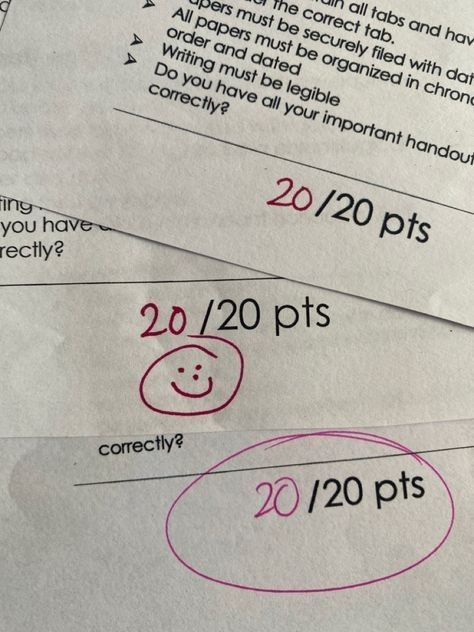
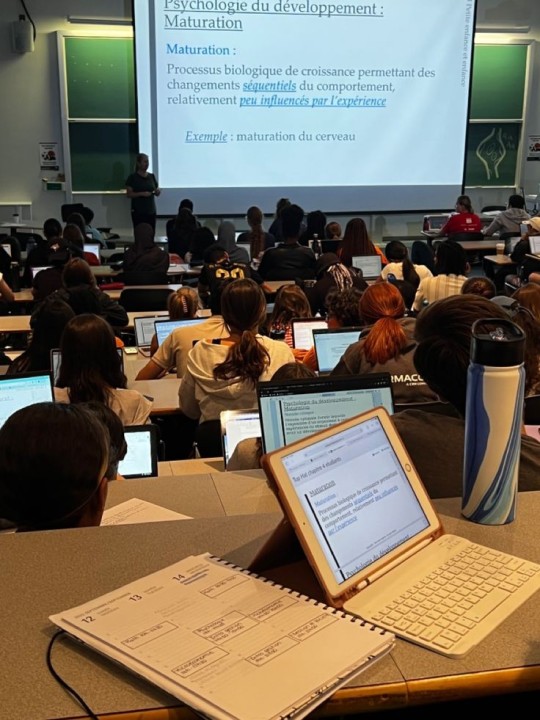
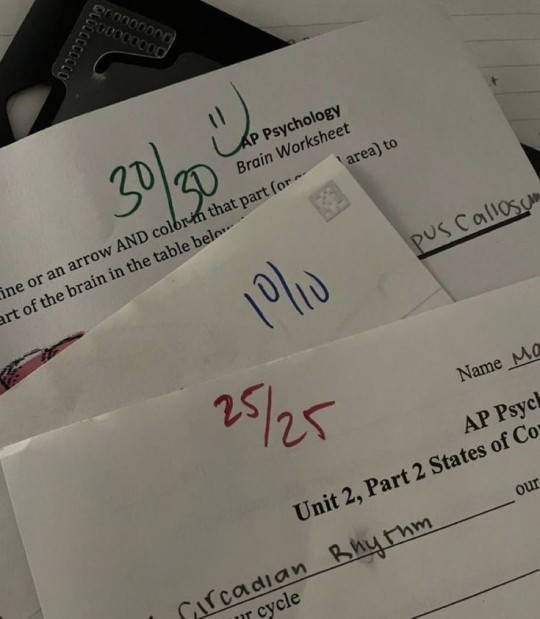
❥﹒♡﹒☕﹒ 𝗽𝗿𝗼 𝘁𝗶𝗽𝘀 𝘁𝗼 𝗴𝗲𝘁 𝘀𝘁𝗿𝗮𝗶𝗴𝗵𝘁 𝗮'𝘀
having good grades doesn't necessarily mean you're smart, a test or exam can't always determine someone's intelligence, but it's academic validation we crave, right? so here are some tips thanks to which you will get straight a's.
𝟭. understand what the professor wants ( 🪼 )
learning the entire book by heart is tiring and basically useless. we take our education seriously, but it's impossible to know everything about everything, so inevitably there will be topics we can gloss over. check old tests, listen to the teacher during the lecture, talk to students who have already attended the course and passed the exam. understand which aspects your professor particularly cares about and concentrate on those, your exam will certainly go well.
𝟮. strengthen your memorization ( 🦋 )
very often the amount of things to study is just too much and, even though you spend all day in the library rereading the topics again and again, you feel that it is not enough. you get confused, you forget steps, you get lost in the labyrinth of the subject. investing in understanding your form of memorization will benefit you in the long run. identify your type of memory (spatial, photographic, echoic, etc.) and focus on how to improve it. having a good memory will make your studying for the exam much faster and easier.
𝟯. pay attention in class ( 🫧 )
attend all lectures and take notes. much of your studying comes from your professor's lecture. underline the important things in your textbook, carefully follow their speech and - if there are any - their powerpoint slides, writing only the things that the teacher adds and which are not written either in the book or in the extra material, if necessary, record the lesson so you can listen to it again at a later time.
𝟰. organize your notes the same day ( 🧃 )
when i take notes in class i write badly and quickly to keep up with the teacher, shortening words or omitting passages. by reorganizing your notes that same evening (at most the next day, if you really don't have time) you can revise your work when the lesson is still fresh in your mind; if you wait too long, you will forget most of the things and you will find yourself staring blankly at pages of notes which, at that point, will seem more like hieroglyphics to you than anything else.
𝟱. use ai responsibly ( 🪴 )
artificial intelligence is everywhere nowadays and why not use it to our advantage? of course i'm not suggesting that you let an ai take care of all your tests and essays, it wouldn't make sense, however very often it helped me make a list of key points to develop in a research paper, or gave me excellent ideas and insights for projects. they can also be used to create flashcards, summarize and simplify articles, or create practice tests based on the material you will have to study.
𝟲. delve deeper into your “whys” ( 🌾 )
sometimes when i study i stare into space and wonder why i am studying something that seems completely irrelevant to my path. i'm sure it happens to you too, don't ignore this feeling. don't be afraid to explore themes and topics that aren't clear to you, if two statements seem contradictory ask yourself why, if you don't understand some passages, don't be afraid to ask a question. we study for ourselves, before studying to graduate, to work. there is no shame in not understanding, your intelligence lies in striving to clarify what seems obscure.
#school#note taking#college#studyinspo#academia#education#university#study tips#study inspiration#study notes#study motivation#student#study aesthetic#study blog#studyblr#studyspo#pro tips to get straight a's#straight a student#straight a's#architecture#architecture student#architecture studyblr#university life#univeristy#uni life
241 notes
·
View notes
Text


My ideal routine in Japan would be structured, purposeful, and self-empowering. I crave efficiency, mental and intellectual stimulation, independence, and control. I hope this can be an inspiration to plan out your routine in your ideal destination!
5:30 AM – 8:00 AM | Morning Discipline & Prime the Mind
Wake up in a clean, minimal ryokan or capsule hotel: There’s something profound about waking up before the world moves. At 5:30 AM, Tokyo is hushed and efficient. The chaos hasn’t started yet—and that’s exactly when I want to start. The air feels crisp, almost untouched, as the city slowly stirs to life. I grab a quick coffee from a vending machine, its warmth cutting through the cool morning. The streets are nearly empty, save for a few early risers and delivery workers. This is the perfect time to wander, to soak in the quiet beauty of Tokyo before its energy surges.
essential skin care, clean outfit, stretch in silence: I take a moment to stretch in silence, letting my mind settle and my body prepare for the day ahead. I'm not the type of person to have a 15-step skincare routine; I like a basic and efficient routine. After, I am most likely to wear an academic, androgynous, minimalist outfit catering to my personal style that I got from a Japanese thrift store.


1:30 PM – 4:30 PM | Intellectual Deep Dive & Tactical Exploration
Every morning has a target. I don’t wander; I hunt insights. On Monday, I go to Miraikan. Study exhibits on AI, robotics, and space; take notes on Japan’s vision of the future. On Tuesday, I will analyze philosophy in Kyoto’s gardens. On Wednesday, I visit some of the best of Japan's Brutalist buildings. I treat each location like a case study.
Eat quietly at a minimal spot (a soba bar or bento cafe): Journal about what I learned that day, After lunch, I might take a stroll through a nearby park or visit a local art gallery. These moments of leisure are vital for recharging my mind and sparking new ideas. They remind me of the beauty that exists in everyday life and the importance of taking time to enjoy it.
4:30 PM – 6:00 PM | Reflective Transition & Tactical Planning
As the afternoon transitions into evening, I carve out time for productive solitude. This is when I reflect, strategize, and plan for the future. I find a quiet café or a library, an atmosphere that fosters focus. With a cup of matcha or hojicha by my side, I delve into my personal projects or professional goals. Around this time, I might head to a serene yet functional gym in Tokyo. Alternatively, I could participate in a martial arts class, such as kendo or aikido, immersing myself in the discipline and philosophy behind these practices.
I also use this time to plan the next day meticulously. Whether it’s mapping out the logistics of visiting a cultural site, scheduling work or study sessions, or noting down books or articles to read, this planning phase is essential. It allows me to maintain control and ensures that each day has purpose and direction.
6:00 PM – 8:00 PM | Culinary Simplicity & Evening Calm
Back at my accommodation, I prepare a minimalist but satisfying meal—perhaps a fresh salad, miso soup, or rice with grilled fish. Cooking in a small, functional kitchen feels meditative, and I enjoy the process as much as the result. I eat slowly, savoring each bite, while reflecting on the day’s experiences. If I’m not in the mood to cook, I might visit a quiet izakaya or a cozy soup shop nearby, enjoying the ambiance of the space.
8:00 PM – 10:00 PM | Solitude & Creative Play
By this time, the city outside begins to wind down, and so do I. I retreat to my room, dim the lights, and create a cozy atmosphere. I put on a jazz record or some other music, letting the sound wash over me. This is my time for creative play—building a space-themed LEGO set, sketching ideas in a notebook, or even writing down thoughts and plans for the future. The tactile nature of these activities feels grounding and satisfying, allowing me to unwind in a way that’s both productive and restorative.
10:00 PM – 11:00 PM | Wind Down & Prepare for Tomorrow
As the day comes to a close, I focus on winding down my mind and body. I take a warm shower, enjoying the sensation of the water washing away the day’s stresses. My evening skincare routine is quick and efficient, just enough to feel refreshed. Before bed, I might read a few pages of a book—something thought-provoking with darker themes but not too heavy—or listen to a relaxing podcast. By 11:00 PM, I’m in bed, ready to recharge and prepare for another purposeful day ahead.


This structured yet flexible routine allows me to balance productivity and leisure, independence and connection, stimulation and tranquility, all while embracing the unique rhythm of life in Japan.
#girlblogging#it girl#lucky girl syndrome#lucky girl#japan travel#japanese#japanese art#japan#kyoto#tokyo#japan photos#travel#travelling#travel destinations#vlog#travel blog#that girl#fypシ
12 notes
·
View notes
Text
☆ Welcome~! ☆
My name is Secret, and I use Any/All pronouns (they/she/he/it)
This is my main blog, my side blog for art and cosplay is @wiindsoxk!
For all my links click HERE !
.・゜-: ✧ :-
�� About Me:
I LOVE music very much! ☆All posts will contain a song and lyrics that I've been liking recently! I listen to just about all genres and love experimenting.
My style is important to me! ☆ I value self-expression and exploration. Everything I wear is for fun and a means of presenting my art, gender and whatever I'm feeling or loving.
I am an academic! ☆ I am currently pursuing my Masters degree, and may occasionally be delayed on posting due to life circumstances. I consider myself to be a life long learner and love research.
It's hard to label my style! ☆ I would consider myself to be goth, and heavily participate in that scene, but I come from emo and academia based roots and tend to just wear whatever I'm drawn to that day <3
.・゜-: ✧ :-
I'm friendly!! Feel free to ask questions or shoot me a message (just don't be weird! :p) I am always looking for other alternative fashion mutuals as well! :>
.・゜-: ✧ :-
☆ FAQ:
Q: Where do you shop?
A: Thrift stores & small businesses. I prefer to shop locally and avoid fast fashion consumption!
Q: Can I use your photos as references for my art?
A: Yes! Absolutely!! If you do, please tag me, I would love to see what you create. (This excludes use of AI.)
.・゜-: ✧ :-
☆ Thank you for checking out my page!! Enjoy~! ☆
21 notes
·
View notes
Note
"chatgpt writing is bad because you can tell when it's chatgpt writing because chatgpt writing is bad". in reality the competent kids are using chatgpt well and the incompetent kids are using chatgpt poorly... like with any other tool.
It's not just like other tools. Calculators and computers and other kinds of automation don't require you to steal the hard work of other people who deserve recognition and compensation. I dont know why I have to keep reminding people of this.
It also uses an exorbitant amount of energy and water during an environmental crisis and it's been linked to declining cognitive skills. The competent kids are becoming less competent by using it and they're fucked when we require in-class essays.
Specifically, it can enhance your writing output and confidence but it decreases creativity, originality, critical thinking, reading comprehension, and makes you prone to data bias. Remember, AI privileges the most common answers, which are often out of date and wrong when it comes to scientific and sociological data. This results in reproduction of racism and sexist ideas, because guess whats common on the internet? Racism and sexism!
Heres a source (its a meta-analysis, so it aggregates data from a collection of studies. This means it has better statistical power than any single study, which could have been biased in a number of ways. Meta analysis= more data points, more data points= higher accuracy).
This study also considers positives of AI by the way, as noted it can increase writing efficiency but the downsides and ethical issues don't make that worthwhile in my opinion. We can and should enhance writing and confidence in other ways.
Heres another source:
The issue here is that if you rely on AI consistently, certain skills start to atrophy. So what happens when you can't use it?
Im not completely against all AI, there is legitimate possibility for ethical usage when its trained on paid for data sets and used for specific purpose. Ive seen good evidence for use in medical fields, and for enhancing language learning in certain ways. If we can find a way to reduce the energy and water consumption then cool.
But when you write essays with chatgpt you're just robbing yourself an opportunity to exercise valuable cognitive muscles and you're also robbing millions of people of the fruit of their own intellectual and creative property. Also like, on a purely aesthetic level it has such boring prose, it makes you sound exactly like everyone else and I actually appreciate a distinctive voice in a piece of writing.
It also often fails to cite ideas that belong to other people, which can get you an academic violation for plagiarism even if your writing isn't identified as AI. And by the way, AI detection software is only going to keep getting better in tandem with AI.
All that said it really doesn't matter to me how good it gets at faking human or how good people get at using it, I'm never going to support it because again, it requires mass scale intellectual theft and (at least currently) it involves an unnecessary energy expenditure. Like it's really not that complicated.
At the end of the day I would much rather know that I did my work. I feel pride in my writing because I know I chose every word, and because integrity matters to me.
This is the last post I'm making about this. If you send me another ask I'll block you and delete it. This space is meant to be fun for me and I don't want to engage in more bullshit discourse here.
15 notes
·
View notes
Text
y'know while we're on the topic of the fake eunuch fans i was on youtube a couple of months ago trying to find the cctv tv show "Zheng He Goes West" (i found it. it was mid) and long story short i stumbled upon a bunch of ai-slop videos with your standard lazy, vaguely asian, computer regurgitations. and i see not one. not two. but THREE pictures of zheng he, famous eunuch explorer of the ming dynasty, with a fucking BEARD. i am exploding you with my mind. im exploding your channel. im going to tie you to the kitchen chair and explain endocrinology until one or both of us hemorrhages to death.
like, this small detail just encapsulates everything i find abhorrent with people trying to pass off generated images as "art", or trying to justify their laziness by claiming it's just another tool that frees them from the tyranny of Big Art and their oppressive dogma of...Putting Effort Into The Shit You Create, i guess? i'm over here doing my amateur hour comics where i'm reading academic articles, making my own clothes, and recreating costumes from wall engravings, funerary figurines, and scraps of fabrics found in tombs to try and bring this time period to life, because i care about this shit. because the fact that i'm learning about new things IS the point. if i spend another week redrawing four pages of already-finished comic after i realized the character's hat was from the wrong time period, it's because i respect my audience enough to notice. it's because im proud of my own attention to detail. most of all, it's because i love drawing more than anything in the world, and getting to spend another week on my comic is enjoyable for me. the people who use generated images simply cannot be arsed on all these fronts. it does further than producing a visually appealing picture. they can't be arsed to research, practice, or critically evaluate their work on any level. they are indifferent to the things they make, yet have the gall to demand the attention of their audience.
10 notes
·
View notes
Text
15 Day BL Challenge the Threequel
Day 36: Favourite BL parents/parental figures?
Mr. and Mrs. Kirigun from TharnType the Series/Tharntype 2. I actually loved Tharn's family unit as a whole but I loved his parents, especially in s2. In s1 we got more of Tharn's brother Thorn being a staple but in s2 his parents really shined for me. They always offered Tharn sound advice and pulled from their own experiences as a couple and they treated Type like an actual son. They loved them both together and separately and when Type was beefing with his hubby he was at his in-law's house getting advice from them. He was invited to all the family events and treated as part of the family. They welcomed Type with open arms and helped guide them along the way. I was so happy to see them present for Type's monkhood ceremony. They were never pushy or overbearing just a happy and loving set of parents.
Pete's Dad and Kao's Mom from Dark Blue Kiss. OMG when Pete's dad found out about them I was so terrified because he looked like such a hard ass but he welcomed Kao with open arms. And even though he was hard on Pete about his academics, he was always ready to talk with his son about his relationship problems. He was happy to offer advice to both Pete and Kao not to mention he was always advocating for them to have safe sex. Kao's mom was so patient with her son's coming out. She knew PeteKao were a thing but she didn't push the issue or force him to tell her. She waited patiently and quietly for him to come to her. She protected her son against her trash boss and his son. And she was just always there ready to catch Kao when he fell. Also she really treated Pete like a 2nd son. Both their parents were sweet and loving people.
Leila Lazaro from Gameboys. Listen, I fucking ADORE Leila. She was such a good mom to Cairo. She seemed to have her hangups when Cai came out but she never blamed him for anything that happened even when he blamed himself. She always took accountability for making her son feel alienated in his own home. She sincerely apologized to him and helped him when he was having problems or doubts regarding his relationship with Gav. She allowed her son to temporarily live with Gav so that they could strengthen their relationship and spend more time together before he ultimately had to move out of the city. She gave him room to grow and love and was always there behind him. She was a support pillar in such a new stage in his life. She cried and shared her deepest worries with him. They bonded over their grief and love. They had a beautiful relationship.
Uncle Cheep and Uncle Dej from My Ride. Mork's uncles were gifts from the universe. They didn't even do anything special. They came as their authentic quasi-messy selves. They were there to pick up the pieces of Mork when his trifling girlfriend ditched him. They were there to encourage him to explore his feelings for Dr. Tawan. They gave him sound advice and answered his questions with patience and understanding. They showed Mork what it's like to really love someone. They showed him what family was. They showed him what sacrifice was. They were just two shining examples of where Mork wanted to be later on in life. Sure they had their hangups but they took care of each other and Mork.
Sippakorn and Jaonan from Ai Long Nhai. I don't remember much about Ai Long Nhai but I remember Aiyaret's dads! They showed up and showed out for Ai when his mother basically abandoned him. They raised an intelligent but cheeky son. Sippakorn kept Ai disciplined while Jaonan was a bit softer on him. But I love that Jaonan was the first to knock someone out for even coming at his son wrong. He was so protective of Ai especially when Ai's mother started coming around again. He knew she was up to no good. Also loved seeing a bit of romance between Ai's dad's and I loved watching them tag team parent Ai. They were wholesome.
Ama from Jack & Joker. Def the best Granny I've seen so far this year (and we've had a lot). She's such a strong driving force behind Jack. She's his fucking rock. She stands behind Jack and supports every decision he makes but she's also going to tell Jack when he's being a complete moron. And she's not just there for Jack, she becomes a Granny to everyone who needs her. She's adopted all the neighborhood kids, Save, and now Joke. Joke sees her as more of a parent than his own. She taught him how to cook and welcomed him with open arms. She even played a huge part in Jack and Joke's reconciliation. She's the sweetest, kindest, sassiest woman who's heart is truly her strongest muscle.
#blchallenge2k24#tharntype#tharntype the series#dark blue kiss#gameboys#gameboys the series#my ride#my ride the series#ai long nhai#jack and joker#jack & Joker
12 notes
·
View notes
Text
Why You Should Not Use ChatGPT for Your Academic Papers
In today's digital age, the temptation to use AI-generated content like ChatGPT for academic papers may be alluring, but it comes with significant pitfalls. This essay highlights why students should refrain from relying on AI tools for their academic work, emphasizing the importance of genuine learning, ethical concerns, and the risks of academic dishonesty.
Loss of Genuine Learning:
Dependence on AI-generated content deprives students of the opportunity to develop critical thinking, research, and writing skills. Genuine learning occurs through the process of exploration and inquiry, which AI cannot replicate.
Ethical Concerns:
Using AI-generated content without proper citation raises ethical concerns. Academic work should reflect the author's original thought and effort, and failing to give credit to AI-generated sources constitutes plagiarism.
Inaccuracies and Misinformation:
AI-generated content may contain inaccuracies, outdated information, or biased perspectives. Relying solely on AI risks presenting flawed or misleading data in academic work.
Academic Dishonesty:
Using AI to complete assignments or essays can be classified as academic dishonesty in many educational institutions. This can lead to severe consequences, including failing grades or even expulsion.
Limited Personal Development:
Academic work is not just about the end result but the journey of personal growth. Engaging with the material, conducting research, and formulating arguments are valuable experiences that should not be replaced by AI convenience.
Using AI for academic work undermines learning, ethics, and integrity while missing out on personal growth. Genuine education values knowledge and skill acquisition through challenges, not shortcuts.
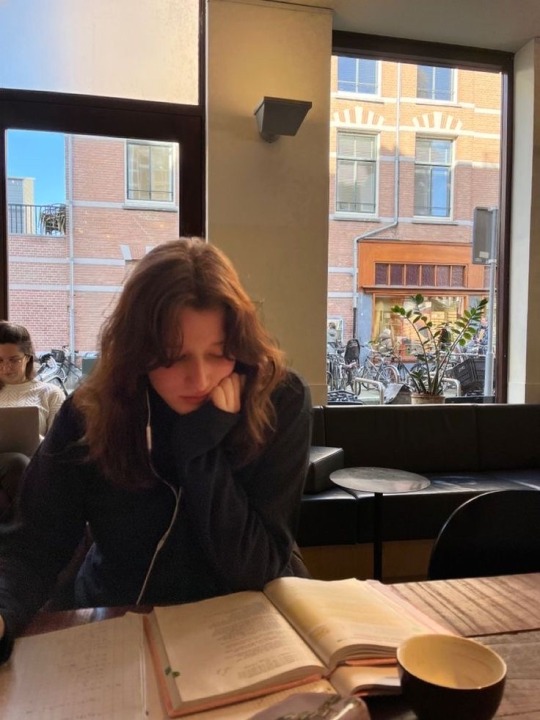

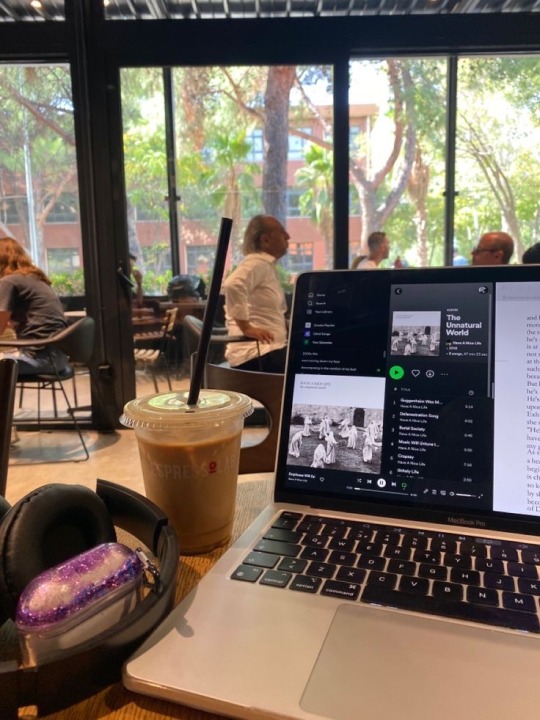
#college life#student#study#studying#university#student life#college#study space#study hard#exam stress#studystudystudy#online exam#funny content#funny jokes#uni life#students#ai#academicperformance#study notes
47 notes
·
View notes
Text
Actually I use AI.
And I don't even think it's that bad:
I don't have access to therapy (it's expensive and I can't ask my parents that money).
Sometimes when I really need to talk about something and I feel alone and I know that my friends and family can't understand me or help me in a useful way (like the way a therapist would) I open ChatGPT and ask it advice.
No, it does not use my data for training, I didn't gave access to memorization and personalization of my input, every chat is a reset.
And no, I am not using a chatbot to replace human connection, I still talk to friends, I just don't want to drop onto friends the whole weight of everything I am feeling, I let them see what they can handle, and ask for closeness and love, I don't ask them to fix my issues.
I also use it for university.
I don't make it write my essays, but I do ask it to check for typos when I am finished writing because I can't see them, when I re read my work it plays in my head because I have it memorized and I cannot notice if the word I carefully picked has a random x in the middle of it.
And last month I had a very specific idea in the back of my mind, an idea that I came up with, with my own thinking, and I was looking for academic sources to back it up, but I didn't know if there are any sources and I had been exploring on google scholar for an hour. The last string before giving up and acting as if I invented that idea, was to ask ChatGPT if there is something similar in the literature.
Turnes out there is. And I was just lacking the key words for a concept I didn't know was actually researched.
You can't convince me that these are "lacking critical thinking" or "outsourcing my brain's work", these are new tools for things we weren't able to do before AI.
If I didn't have access to it, I would not be better off. I would simply be out of therapy without any tool for coping. I would simply have written a stupid essay because I wasn't able to find the sources.
Telling everyone that AI is always evil and they should never even touch it, will NEVER work.
Like with every issue, every technology, the challenge is to get people to use it responsibly.
6 notes
·
View notes
Text
Unlock Your Creative Potential with a Diploma in Digital Content Creation in Dubai
In today’s rapidly evolving digital world, content is more than just king—it’s the entire kingdom. Whether it’s engaging videos, compelling social media campaigns, or immersive storytelling, the demand for skilled digital content creators has never been higher. That’s where edumatrix steps in with its cutting-edge Diploma in Digital Content Creation in Dubai—a program designed to equip future creators with the skills, tools, and vision needed to thrive in the digital age.
Why Choose a Diploma in Digital Content Creation in Dubai?
Dubai is not only a global hub for business and innovation but also a hotspot for media, marketing, and creative industries. By enrolling in a Diploma in Digital Content Creation in Dubai, you’ll gain access to a vibrant creative economy, hands-on training, and exposure to real-world projects that mirror the demands of the industry.
At edumatrix, our curriculum is curated by experts in media, marketing, and design. From video editing and graphic design to digital storytelling and social media strategy, we cover all facets of content creation. Students will also gain exposure to the latest tools and platforms used by professionals globally.
A Holistic Approach to Learning
Our diploma program goes beyond just technical skills. We emphasize creativity, communication, and strategy, ensuring our graduates can not only create content but also understand the psychology of audiences and the dynamics of digital marketing.
Students benefit from:
Expert-led workshops
Hands-on projects and real-time feedback
Industry-standard software training
Portfolio development for job readiness
Whether you’re a recent high school graduate, a career switcher, or a working professional looking to upskill, this diploma offers a flexible and future-proof path to success.
Expand Your Horizons with edumatrix
While our Diploma in Digital Content Creation in Dubai is one of our flagship programs, edumatrix is also proud to offer a diverse range of professional courses, including:
Hospitality Management Courses UAE Perfect for those looking to build a career in one of the UAE’s most dynamic and customer-focused industries. Our hospitality courses combine theoretical knowledge with real-world internships in leading hotels and resorts.
Artificial Intelligence Courses in Dubai AI is reshaping industries across the globe. Our AI programs are ideal for tech enthusiasts and professionals aiming to lead in automation, machine learning, and data-driven decision-making.
Why edumatrix?
As a trusted name in education and professional training in the UAE, edumatrix stands for quality, innovation, and student success. Our mission is to bridge the gap between academic learning and real-world application, empowering learners with relevant skills for today’s job market.
With expert faculty, modern facilities, and strong industry connections, edumatrix is your gateway to a future-proof career—whether in content creation, hospitality, or AI.
Ready to Take the Leap?
Step into the world of creativity and innovation with edumatrix’s Diploma in Digital Content Creation in Dubai. Explore your passions, master in-demand skills, and turn your ideas into powerful content that connects, influences, and inspires.
Visit edumatrix to learn more and enroll today.
#Diploma in Digital Content Creation Dubai#Hospitality Management Courses UAE#Artificial Intelligence Courses in Dubai
2 notes
·
View notes
Text
okay so google drive is being a lil sketchy w AI stuff and it frankly makes me just uncomfy enough to look for an alternative.
the one that i have landed on (for now) is obsidian bc it works nicely for what i typically use google docs for (outside of academic stuff for college) and the reviews on the app store were MUCH better than evernote, which i also considered. so here are a list of what i consider pros and cons
pros
the organization! the style of organization works really well for me personally, with folders and the ability to link to other notes. this helps me keep character development and world building uncluttered during the process
tagging! you can set tags within each file, or vault, in order to better find notes or graphics. i haven't explored this a ton yet BUT it seems promising especially when files get bigger and more complicated
themes! you can customize the colors and themes inside the app (im using 80s neon rn) which isnt super critical for me but is helpful for people who benefit from being able to change that (i personally just enjoy it)
free use of like 99% of the app! the app itself is free and no app features are "off limits" without payment. vvv
cons
does NOT sync automatically. you CAN sync between devices but it is an $8 monthly subscription which i just cant afford on top of other monthly payments rn. maybe one day. (other payment plan is a $50/year fee for commercial use and priority support)
a little complicated. theres no real tutorial so anything beyond basics i've figured out by hitting buttons until they did something. if youre up for a little trial n error learning or asking other people about it, its fine
#google docs alternative#google docs#obsidian app#writing#creative writing#writers#writers on tumblr
65 notes
·
View notes